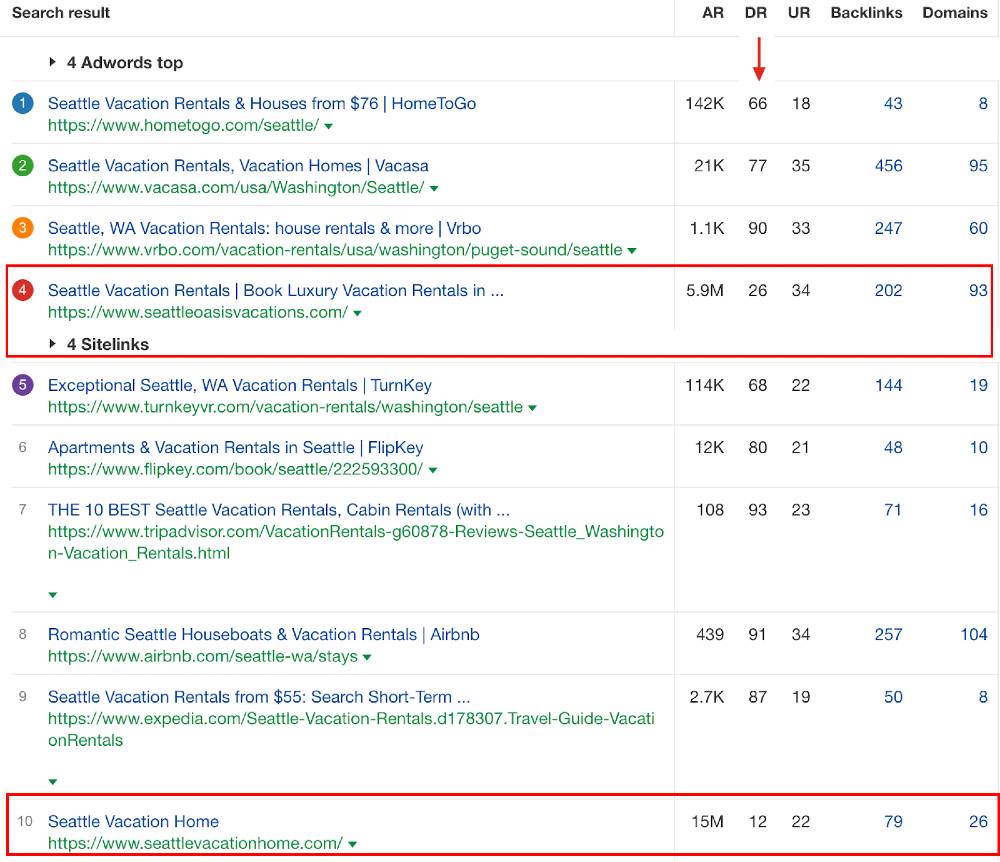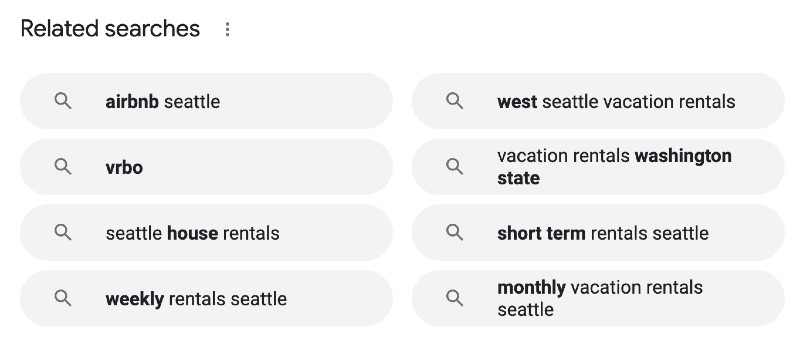Did you know that more than 90% of online users turn to search engines first when they have questions? As a property manager, you have to think of Search Engine Optimization as an essential way to garner more traffic and cement your company’s online presence as a trustworthy authority.
Here are seven of the most common SEO mistakes we see property managers making:
- Expecting to Outrank the OTAs with Low Authority Websites
- Not Targeting Long-tail Keywords
- Not Realizing How Important Your Website is to Your Business
- Improper Management of 301 Redirects for Properties & Pages
- Uploading Oversized Images to Property Pages and Blogs
- Not Writing Professional Property Descriptions
- Not Utilizing Analytics
Besides, if you want your website to be visible at the top of the search results of Google, you will need to learn about the do’s and don’ts of SEO. For the most part, you don’t have to be an SEO professional or IT expert to follow the basic guidelines.
In fact, you’d be surprised how fast your website can capture the attention of visitors through keyword optimization alone.
Property managers have a unique opportunity to make the most out of each aspect of SEO to rank high on search engine result pages (SERPs).
You can’t take the online growth of your property management website for granted — you must be willing to put in the behind-the-scenes work that will yield long-term results for your business. Here, you’ll discover how to avoid the seven most common SEO mistakes property managers make.
1. Expecting to Outrank the OTAs with Low Authority Websites
Often, property managers make a mistake and assume that websites that have been optimized for relatively generic key phrases, such as “Florida vacation rentals” or “Michigan lake houses,” would rank higher than they actually are.
Disregarding the competitiveness of local markets and possessing preconceived notions about local keywords can lead to problems.
In many instances, vacation rental managers overlook or don’t invest in SEO. As a result, they ultimately have low domain authority and it is typically quite challenging for these vacation rental managers to rank highly in the OTAs domain.
Property managers can check their website’s domain authority using the Moz Domain Analysis tool…which is free.
Often, when property managers want to improve SEO, they are primarily looking to improve their rankings for core keywords, such as “Seattle vacation rentals” or “Marco Island vacation homes”.
Generally speaking, these are extremely competitive terms and shouldn’t expect to outrank OTAs without significant SEO work.
If it’s the first time a VRM has started an SEO campaign, they may have a domain rank (DR is Ahrefs’ website authority score) that is very low.
Review Search Results for Authority
Here’s an example of search results for “Seattle vacation rentals”:

There are only two sites on this page that are not major online travel agencies. And, both of these property managers have domain names with some authority.
Without ongoing work, it’s unlikely you’re going to outrank anyone on this page. This is not to say, however, that it can’t be done! After all, that’s why you’re reading this guide.
This brings us to the second major SEO mistake property managers tend to make.
2. Not Targeting Long-tail Keywords
Travel property managers must understand that they simply cannot compete with big-name OTAs without high-quality, engaging content, high-targeted volume, authoritative domains, and the use of long-tail keywords.
Targeting long-tail keywords — which may include amenities (pet friendly, offers a pool/hot tub, etc.) or specific home types (waterfront property, etc.) — has several benefits.
Less competition, fewer online travel agencies on SERPs, and lower cost. All of these combined make for a very attractive keyword strategy.
Of course, you don’t have to spend a lot of time searching for long-tail keywords. We’ve written about some high level strategies before — check out our guide to finding the best vacation rental keywords.
Use Related Searches from Google
A quick solution from that page is to search for your main keyword, then scroll to the bottom of the page, where you will find a “Related searches” section.

This will provide you with several alternative searches related to your first query. Clicking one of these will provide you with yet another set of related search terms you can choose from.
3. Not Realizing How Important Your Website is to Your Business
As a general rule, short-term rental property managers spend money on OTAs, online ads, and various other marketing tactics both online and offline.
All of these should, of course, be part of a well-rounded marketing strategy, but keep in mind that your website plays a key role in whether or not prospective guests ultimately book properties.
After all, most of these marketing initiatives ultimately direct people back to your website.
Your Website is Your Marketing Hub
If your direct booking website isn’t up to snuff and guests can’t easily make reservations, find information they are interested in, or contact you, they will probably leave and their visit will be a wasted chance at securing a client.
The user experience (UX) on your website is a reflection of your brand!
Think about what you want to convey and how you want prospective clients to view your company. It takes effort to keep things running smoothly in a property management business and a website is no different.
Your direct booking site should be on your list of tasks to audit or review annually (if not more frequently) to ensure you aren’t at risk of losing guests due to a poor online experience.
An annual or semi-annual audit will allow you to sustain the appeal of your site, even as guest preferences change — you can make necessary tweaks as the vacation rental industry shifts.
Unfortunately, many rental property managers tend to forget or overlook the importance of their website in regard to both SEO best practices and a solid overall marketing plan.
4. Improper Management of 301 Redirects for Properties & Pages
For some property managers, property turnover is a common occurrence.
Or, a website redesign causes property page URLs to change.
Or, perhaps properties are given more appealing names and their URLs are altered as a result.
All of these cases, and others like them, can lead to ranking problems if not properly handled by your web developer or SEO team.
For instance, if you change the name of the property and don’t have automatic 301 handling, you will lose authority and visitors are likely to receive 404 error pages.
Set Up Automatic 301 Redirects
On WordPress, it is possible to set up automatic redirects using a plugin like Redirection.

Basically, any time an existing URL changes (pages or posts on WordPress), this plugin will detect that change and set a redirect rule for the old URL to the new URL.
This is helpful because it saves a step for you or your web development team and ensures that your website continues to run smoothly, even when changes are necessary — as they commonly are in the property management field!
Once you understand this cause-and-effect, it makes sense to roll out an SEO audit once a year to pinpoint any mistakes.
If your website undergoes any sort of major overhaul, make sure that 301 redirects are not overlooked or you could find yourself dealing with multiple pages that return errors, potentially causing visitors to view you as untrustworthy and leave your website.
5. Uploading Oversized Images to Property Pages and Blogs
Many property managers do not fully understand how image size and other seemingly unrelated issues can impact search engine optimization. There is nothing wrong with this — after all, you can’t be an expert in everything!
However, when you’re migrating to a new website or PMS, one thing that might get completely overlooked is the size of images that you upload for your new webpage.
Oftentimes, the result of this inadvertent error is a site that loads slowly and negatively impacts your SEO.
Create Internal Checks for Images
The best way to avoid this common mistake is to turn to the pros:
- Work with SEO experts who specialize in site speed and who have a good grasp of current SEO best practices. They can do the heavy lifting and get your site in a position to rank better.
- Ask your web developer to provide an image size cheatsheet that gives detailed information on what size image each page template should be using. This will allow you to better understand what types of photos and graphics you should be using if you opt to do some of the backend work yourself.
If you’re using WordPress, there are some built-in features that are designed to automatically resize images, but it’s worth noting that they don’t always work perfectly out of the box.
Instead, you will need to spend some time setting them up for your specific website requirements.
Some PM systems also have features within their gallery upload process that will reduce image sizes and automatically scale dimensions to the appropriate size.
But it’s always nice to know what those dimensions should be before you begin. This is where requesting an image size sheet can come in handy!
6. Not Writing Professional Property Descriptions
When would-be vacation home renters visit your website, the images of your properties will undoubtedly be what initially draws them in.
Whether your vacation homes are situated on white sand beaches or on craggy mountaintops, stunning photos are the first step to turning prospects into clients.
However, other things matter, too — namely, the descriptions of your properties. Once guests are hooked by aesthetically pleasing images, they will begin reading about each of the vacation rentals you have to offer.
And, it’s your job to make sure the descriptions leave them wanting to experience your offerings for themselves.
Often, guests will select a property based on the images or location and then get to the page and want to read through the details of the property. That’s where your descriptions come into play.
Thoroughly Describe Each Unique Property
Be sure you’re describing each property thoroughly and not leaving anything out. These details just might be the deciding factor in whether or not a particular guest books a trip!
The more information you provide, the more likely it is that people will feel comfortable booking with you because your transparency and honesty will shine through.
Furthermore, having unique, detailed descriptions is great for SEO, as this content can help your properties surface when people search for specific keywords, such as “Lake Michigan vacation rentals with hot tubs” or “pet-friendly California beachfront vacation rentals”.
As we know, the higher you rank, the more likely you are to secure bookings!
A few tips for writing great descriptions:
- Know your audience – Understanding what your demographic wants is key to writing great descriptions. Vacation rental managers whose primary focus is on renting to families with young children, for example, need different content than those whose properties mainly appeal to honeymooners looking for romance.
- Focus on USP – Your USP (unique selling proposition) matters more with each passing year in the vacation rental industry. As this field becomes increasingly competitive, it is crucial to make sure you have a selling proposition that is actually unique and sets your company — or, in some cases, individual property — apart from all the rest.
- Storytelling is key – Travelers want to be able to envision themselves having the vacation of a lifetime while staying in a particular space. The more immersive your property descriptions are, the more likely website visitors are to book. Once they begin seeing themselves in the homes you have to offer, it will be harder to click the “X” on a browser tab.
7. Not Utilizing Analytics
Unfortunately, most property managers don’t use (or have access to) analytics data to understand their visitors.
In many cases, this is simply because PM systems don’t offer extensive analytics features or web developers forget to install analytics at site launch.
In fact, reviewing analytical data is critical to catching SEO errors and continuously improving your site experience.
Install Analytics
There’s two main analytical platforms that we always recommend or set up at the start of an engagement.
Google Analytics and Google Search Console.
Both are very important for understanding the performance of your site.
Google Analytics is great for:
- Tracking bookings and the revenue associated with those bookings, and what marketing channel attracted them to the site to book.
- Understanding which pages on your site get the most pageviews, or attention, from all types of visitors regardless of which channel they came from.
- Understanding how much of your audience is coming from mobile devices or desktop computers.
Google Search Console is great for:
- Search engine related information from Google
- Technical data: Crawling & indexing errors, mobile-friendliness, structured data markup, ranking fluctuations, 404 errors, etc
- Viewing search query data right from the source. Google shares some ranking data, click-through-rates and impressions, and page-level keyword data that your visitors have used to find your site.
Property managers should install analytics software to track visits, keep an eye on revenue, growth rate, and review bookings in real-time.
As a property manager, you should have the ability and tools to measure all your marketing efforts.
Worried about handling this yourself? Let us help! If you already have a lot on your plate, let our expert team handle analytics for you.
What Would Happen if You Ignore SEO?
In the modern marketplace, ignoring SEO isn’t an option. SEO and search run 24/7/365.
There is no downtime on the internet — people are always searching from somewhere in the world.
To give your property management company the best chance to succeed, it’s important for you to understand SEO (or to hire someone who does!)
If you ignore SEO, your competitors are likely to surpass you both in search and in overall results.
By positioning your company well from an SEO standpoint, you automatically give yourself a better chance at success.
And, really, why wouldn’t you want to do everything you can to get a leg-up in a hyper competitive industry?
It’s not uncommon for property managers to find themselves focused on the aesthetics of their website instead of the nitty-gritty details of SEO.
In reality, though, these two aspects of your website work in tandem to achieve the results you want.
After all, even if you have the most visually appealing website in the world, it doesn’t matter if potential guests aren’t finding you when searching!
By focusing on SEO first, you will lay the foundation you need for a strong online presence for your business. Then, much like decorating a house, you can add the pretty finishing touches once the foundation is solid.
Remember, if you find yourself feeling overwhelmed by all of this information, we are here to help you reach your goals.













